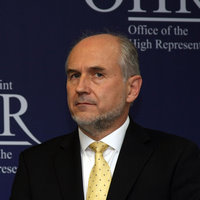Last month, two rounds of high-level meetings on the future of Bosnia took place at the military base of Butmir, on the outskirts of Sarajevo. The meetings recalled similar talks held almost 15 years ago, at another military base in Dayton, Ohio. Those talks ended Bosnia's raging civil war, and the Dayton Peace Accords of 1995 laid the foundations of the post-war Bosnian state. The current efforts to revise the country's constitutional foundations, and hence make it more functional, have already been called "Dayton 2" by commentators. For now, though, they are unlikely to repeat the success of the original.
The Butmir talks followed the international community's heightened and often-repeated concerns that Bosnia is in the midst of its worst political crisis since the end of the war. And as Valentin Inzko, the U.N. high representative to Bosnia who also acts as the European Union's (EU) special representative, has repeatedly warned, the situation is worsening.
With the Butmir talks, the international community finally decided to act. Chaired by Foreign Minister Carl Bildt of Sweden -- which currently holds the rotating EU presidency -- and U.S. Deputy Secretary of State James Steinberg, the first round of talks on Oct. 9 gathered the leaders of Bosnia's major political parties in an effort to revise the Bosnian constitution. It was followed by a second round, held on Oct. 20-21.

